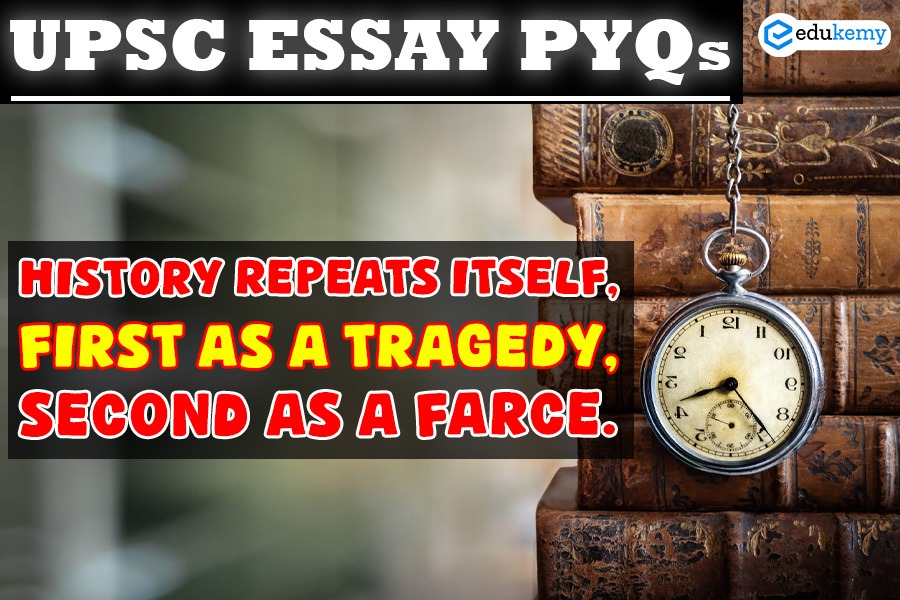1.9K

Explore historical repetition, tragedy, and farce in this analysis of UPSC essay PYQ 2021 with key insights, examples, and case studies.
Contents
Essay Key
| Component | Details |
|---|---|
| Essay Topic | UPSC Essay PYQ 2021: History repeats itself, first as a tragedy, second as a farce |
| Paraphrase | This essay examines how historical events often repeat themselves, changing in form and meaning over time, and reflecting both tragic and humorous aspects. |
| Intent of the Essay | To explore how recurring patterns in history influence collective societal awareness and impact political developments. |
| Keywords | History, Repetition, Tragedy, Farce, Cyclical Patterns |
Key Arguments
1. The Pattern of Historical Cycles
- History often repeats itself, with past events resurfacing in modern forms.
- These repetitions reveal the failure of societies to learn from earlier experiences.
- Evidence/Data: Studies of revolutions—like the French Revolution and the Arab Spring—show striking similarities in causes and outcomes.
2. Tragedy in Historical Events
- Major historical tragedies often arise due to poor decisions and systemic failures (e.g., wars, genocides).
- Their recurrence signals society’s inability to prevent the same mistakes.
- Evidence/Data: The Holocaust, and the genocides in Rwanda and Bosnia, are examples of history repeating itself with devastating consequences.
3. From Tragedy to Farce
- Events that were once tragic are sometimes later portrayed in a humorous or satirical way in media and pop culture.
- This shift can reduce the seriousness of those events and lead to a lack of sensitivity.
- Evidence/Data: War-themed movies and shows often turn real conflicts into comedy or entertainment.
4. Influence on Political Leadership
- Leaders may use past events to justify their actions, whether sincere or manipulative.
- Twisting historical narratives can result in repeating harmful policies.
- Evidence/Data: References to events like the Great Depression are sometimes used to rationalize modern economic decisions.
5. Cultural Memory and Reflection
- How societies remember their past shapes their future decisions and identity.
- The way tragedies are remembered—or turned into farce—affects how people think and behave.
- Evidence/Data: The echoes of the Civil Rights Movement in today’s protests show how certain struggles remain ongoing and unresolved.
Case Studies/Examples
| Case Study | Key Insights | Relevance |
|---|---|---|
| The Fall of Rome and Modern Superpowers | Both the fall of the Roman Empire and the decline of modern superpowers (e.g., USA, USSR) present similar themes of overreach and collapse. | Demonstrates cyclical patterns in power dynamics. |
| The Reign of Terror and Modern Extremism | Both historical and contemporary extremism reflect a failure to channel political dissent productively, resulting in violence. | Illustrates how tragedy can transform into farce in the name of ideology. |
| The Space Race and Current Technological Rivalries | The competition between the USA and USSR mirrored in present-day technological rivalries (e.g., USA vs. China) reveals lessons ignored. | Highlights the repetition of competitive dynamics in global contexts. |

Additional Tips
- Include diverse historical examples across cultures and periods for a comprehensive analysis.
- Discuss philosophical perspectives (e.g., Marxist, Hegelian) on history’s cyclical nature to deepen the argument.
- Explore how awareness of past repetitions can empower contemporary movements to avoid previous mistakes.
- Engage with notable historians or literary figures (e.g., Karl Marx, Georg Wilhelm Friedrich Hegel) who addressed historical patterns and meanings.
- Connect implications of historical repetitions with modern-day issues (e.g., populism, climate change) for a holistic view.

